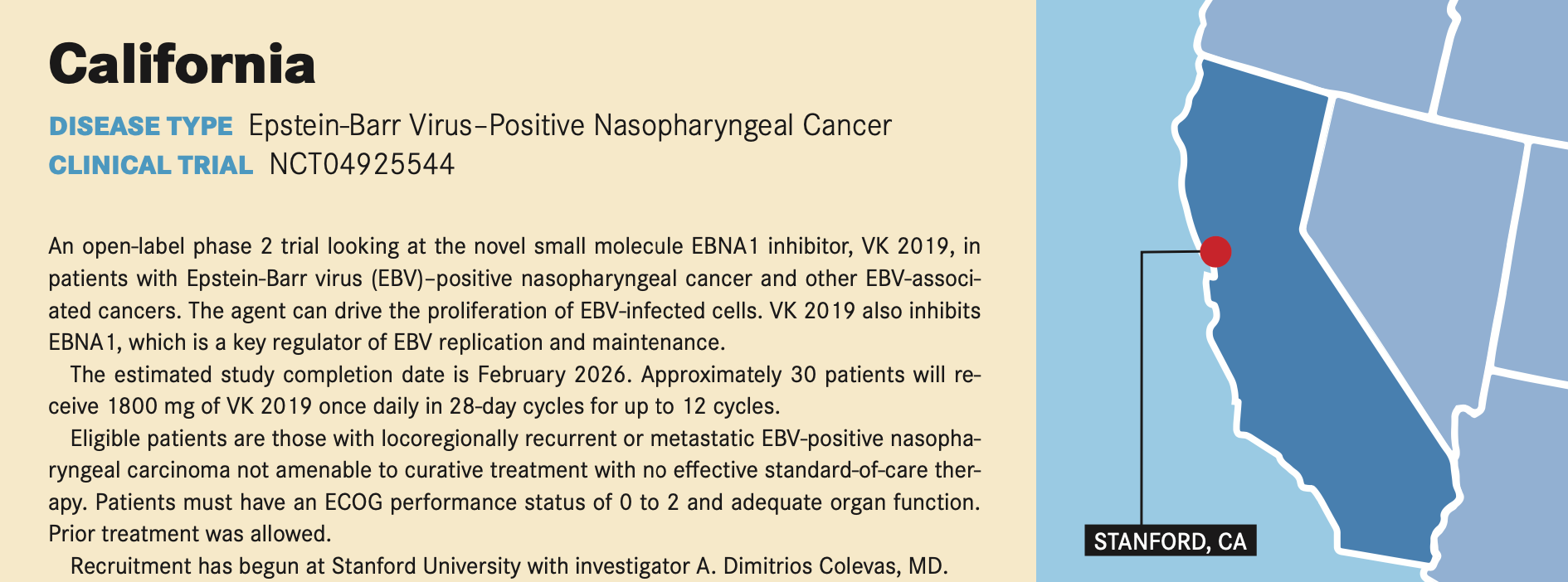New Study Explores EBNA1 as a Target for Epstein-Barr Virus-Positive Advanced Nasopharyngeal Carcinoma
A phase 2 study is preparing to enroll patients with Epstein-Barr virus-positive advanced nasopharyngeal carcinoma, who will be treated with an investigational EBNA1 inhibitor.
Paul M. Lieberman, PhD

A phase 2 study has been initiated by Wistar Institute and Stanford University School of Medicine, to explore treatment with VK-2019, an Epstein-Barr Nuclear Antigen-1(EBNA1) inhibitor, in patients with Epstein-Barr virus (EBV)-positive advanced nasopharyngeal carcinoma who have recurred or progressed following standard therapy or have not responded to prior therapy, according to a press release by Wistar Institute.1
VK-2019 is a small molecule inhibitor of the latent form of EBV that is administered orally. The agent can drive the proliferation of EBV infected cells. VK-2019 also inhibits EBNA1, which is a key regulator of EBV replication and maintenance.
Lead study investigator, Paul M. Lieberman, PhD, endowed professor and program leader, Gene Expression & Regulation Program, The Wistar Institutestated, said in a press release; “EBNA1 is expressed consistently in all EBV-related cancer and is essential for the cancer to grow. By targeting EBNA1, which has a unique protein fold and is present only in the cancer cells, we have so far observed fewer side effects than we typically see with other cancer drugs.”

In the phase 2, open-label clinical trial (NCT04925544), 30 patients will be enrolled and evaluated for the primary end point of response rate. The secondary end points of the study include progression-free survival, overall survival, area under the plasma concentration versus time curve, time to maximum plasma concentration, peak plasm concentration, safety, and pharmacokinetics.2
At screening, patients must have either loco regionally recurrent or metastatic EBV-positive disease per RECIST v1.1. Those enrolled to the phase 2 exploratory cohort must be 18 years of age or older with adequate laboratory values and an ECOG performance status of 2 or lower. Patients cannot be eligible for standard therapeutic options, and any prior anticancer therapy must be completed 4 weeks prior to enrollment. Prior palliative radiation must be completed at least 2 weeks prior to enrollment. Any toxicities associated with a patient’s prior anticancer therapy must be resolved to a grade 1 before joining the study. Further, cases of peripheral neuropathy require resolution to at least a grade 2 prior to the study.
Exclusion from the clinical trial is based on prior therapy, metastatic disease, and the presence on uncontrolled medical conditions.
“We are excited about the potential of VK-2019 in treating nasopharyngeal cancer,” said Troy Messick, PhD, senior staff scientist, Wistar Institute, in the press release.1 “VK-2019 is unique because it targets the underlying driver of growth of this head and neck cancer, namely EBV.”
References:
1. Wistar and Stanford Medicine to Begin Phase 2 Clinical Trial of VK-2019 in patients with epstein-barr virus (EBV)-positive advanced nasopharyngeal carcinoma. News release. January 5, 2021. Accessed January 6, 2021. https://bit.ly/3q0U39d
2. Clinical trial of a novel small molecule EBNA1 inhibitor, VK 2019, in patients with epsteinbarr virus (ebv) positive nasopharyngeal cancer (NPC) and other Epstein-Barr virus (EBV) associated cancers, with pharmacokinetic and pharmacodynamic correlative studies. Clinicaltrials.gov. Accessed January 6, 2021.https://bit.ly/3t5fLLq